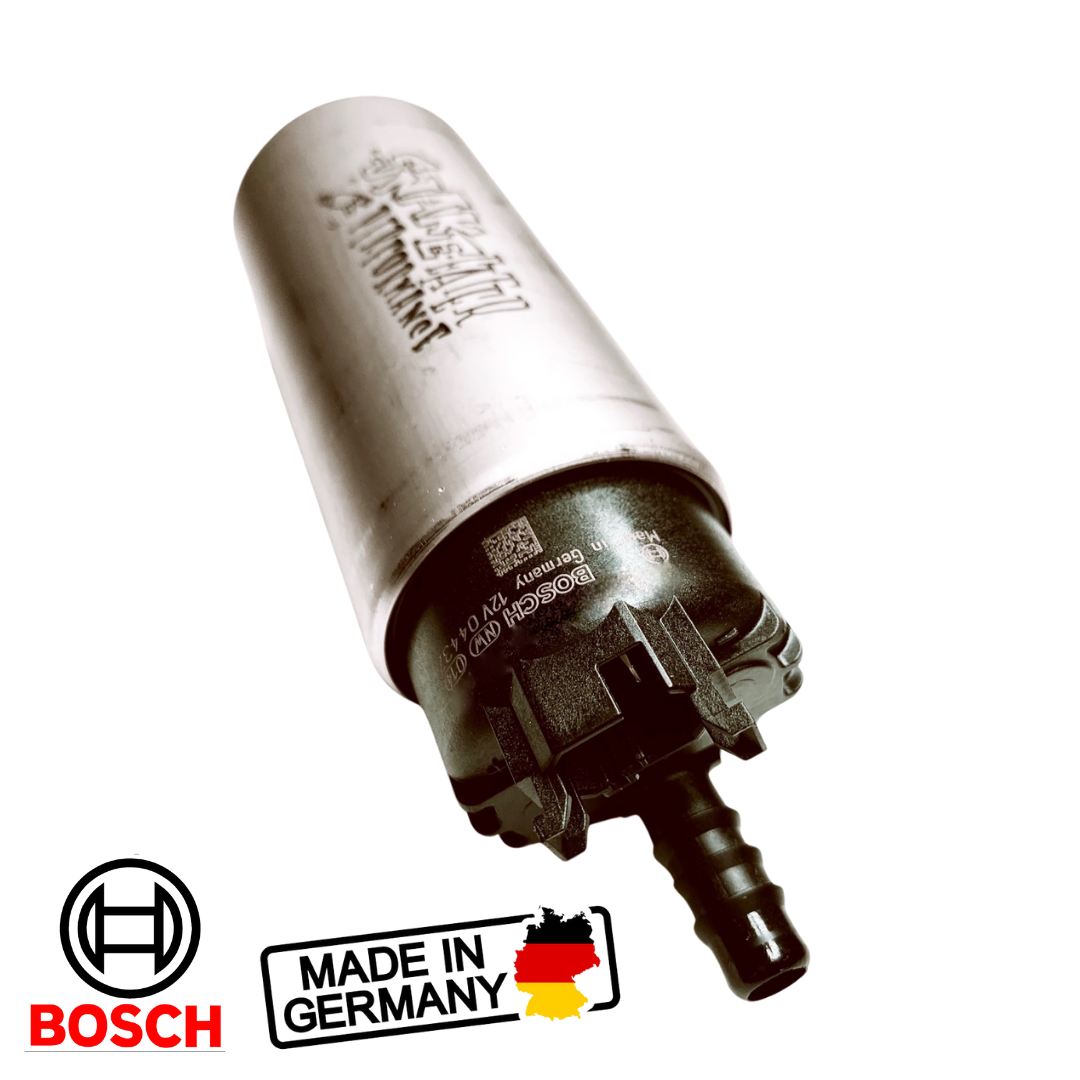540lph Bosch Fuel Pump - Universal In-Tank Fuel Pumps
- Description
- Vehicle Compatibility
- How To Install It
- Legal Disclaimers
Bosch Fuel Pump: Made in Germany
The Pro-Series 540 is among of the highest-flowing in-tank fuel pumps on the market. Out-flowing other in-tank “450 E-85” pumps by over 30% in the 70-100psi range. Designed for use with alternative fuels, Pulsewidth modulation compatible and ultra-quiet turbine pump equipped. Manufactured in Germany in collaboration with Bosch Performance Aftermarket.
A Quality Pump you Can Trust
What does that mean? SEP's unbeatable customer service, support and a lifetime warranty, along with a genuine "Built in Germany", core you can feel great about putting in any build.
The Pro-Series 540 delivers unmatched flow and pressure, with the capability to support up to 900hp for gasoline vehicles, or 600hp for E85 applications. With extreme reliability and a quiet turbine pump design that does not create unnecessary vibrations in the fuel system, the Pro-Series 540 is ideal for high-performance street cars and race cars alike. Its superior fuel flow and pressure make it the ideal choice for vehicles with high-flow injectors, larger turbochargers, or engines requiring large amounts of fuel delivery. The Pro-Series 540 is an excellent option for those wanting to upgrade their fuel system on a budget.
The Pro-Series 540 fuel pump operates on 12V power and comes with hardware for easy installation. It also includes an OE-spec connector for easy plug-and-play installation, as well as a universal fitment kit for compatibility with virtually any vehicle make and model. The pump is compatible with all fuel types including gasoline, methanol, ethanol, biodiesel, and E85 fuels.
All The Parts You Need to Get Going
Installation kit included with each pump contains: 80 Micron pre-pump filter, plug, hose and hose clamps/connectors for installation.
Get genuine SEP/Sh*tBox Supply fittings for this and other pumps
Snake Eater Performance: A No-Pressure Buying Experience
At Snake Eater Performance our goal is to help other car enthusiasts build the car of their dreams and get out on the road or race track. We are here for you every step of the way. So if you have a question, don't hesitate to reach out today or click here to learn how to determine your fuel pump needs.
-Outflows the Walbro F90000267 450 LPH E85 fuel pump: Electric Fuel Pumps TI Walbro HELLCAT 525LPH F90000285 Fuel Pump - (Universal E85 Ethanol) Ultra High-Performance - TI Automotive F90000285 Flex Fuel HP Pump at boosted application pressure ranges. see chart for details
-Compare to Deatschwerks DW400, Walbro F90000267 450 LPH, Walbro HELLCAT 525LPH
Frequently Asked Questions and Information:
Q: Can I replace my own Bosch Fuel pump?
A: Replacing a Bosch Fuel pump is an advanced project that should only be attempted by experienced individuals. In addition to having knowledge of automotive systems, you'll need specialized tools and safety equipment like eye protection, gloves, and coveralls. If you are unsure about completing the task yourself, we recommend taking your vehicle to a qualified technician who can properly diagnose and replace any faulty components.
Finally, if you do choose to replace the fuel pump yourself, make sure to read all instructions carefully and follow safety precautions to avoid injury or damage to your vehicle.
Q: What is the life expectancy of a Bosch Fuel pump?
A: Generally, fuel pumps are designed to last up to 150,000 miles or more in normal driving conditions. However, this number can vary depending on factors such as climate and driver habits. If you drive in extreme temperatures or use your vehicle for towing or hauling, the fuel pump may need to be replaced sooner. Additionally, if you don't keep up with regular maintenance and inspections, a faulty fuel pump can cause serious engine damage that will require costly repairs. It's important to have your vehicle serviced regularly so any issues can be detected early and addressed promptly.
We recommend having your Bosch Fuel pump inspected every 30,000 miles to ensure it is running efficiently. If any problems are identified, you should have them repaired immediately to prevent more serious damage from occurring later on. Proper maintenance and care can help extend the life of your fuel pump significantly.
Q: What are the symptoms of a failing Bosch Fuel Pump?
A: Faulty or failing fuel pumps can cause a variety of symptoms, including engine misfires, difficulty starting, reduced power output, and decreased fuel economy. You may also notice that your vehicle stalls frequently or experiences rough idling. Additionally, if your vehicle does not have enough fuel pressure, it may cause the "check engine" light to come on.
To diagnose a faulty Bosch Fuel pump, it's important to first check the fuel pressure. The best way to determine if the fuel pump is func-tioning properly is to remove the fuel line from the pump
It's important to take your vehicle in for regular maintenance and keep an eye out for any warning signs of failing fuel pumps. Catching these issues early on can help avoid costly repairs down the line. If you have any further questions about Bosch Fuel pumps, please contact a qualified technician or refer to your owner’s manual.
Q: How much does it cost to replace a Bosch Fuel Pump?
A: The cost of replacing a Bosch Fuel pump can vary depending on the make and model of your vehicle. Generally, the parts for newer vehicles will be more expensive than those for older vehicles. Additionally, labor costs can vary depending on how difficult the job is and where you take your vehicle to be serviced.
For an accurate estimate of replacement costs, we recommend taking your vehicle to a qualified technician or Bosch service center for a professional diagnosis. They'll be able to give you a more accurate cost breakdown for replacing your fuel pump.
Overall, replacing a Bosch Fuel pump is an important task that can help keep your vehicle running efficiently and reliably for years to come. If you are upgrading your fuel system, you may need to also upgrade your fuel injectors or throttle body, in addition to other engine components, to handle the additional fuel. Prioritizing regular maintenance and addressing any issues promptly can save you time and money in the long run. If you have any additional questions about Bosch Fuel pumps, please don't hesitate to ask.
Q: What maintenance do I need to perform on my Bosch Fuel pump?
A: To ensure your fuel pump is functioning correctly, it's important to keep up with routine maintenance and check the fuel pressure at least every 30,000 miles. Additionally, we recommend replacing the fuel filter every 15,000-30,000 miles and checking for any debris in the fuel lines.
It's also important to check for any leaks and make sure all of the hoses are tight and secure. If you notice any signs of wear or tear on the pump itself, it's best to replace the fuel pump as soon as possible.
Overall, following these simple maintenance tips can help ensure your Bosch Fuel pump runs smoothly and efficiently for years to come. If you have any additional questions about Bosch Fuel pumps, please don't hesitate to ask.
This part is legal for sale and use on Uncontrolled (Non-Emissions Controlled) Vehicles and Racing Use Only Vehicles.
The following vehicles are considered Uncontrolled (Non-Emissions Controlled) Vehicles:
- 1965 and older U.S. manufactured California Certified vehicles
- 1967 and older U.S. manufactured Federally Certified vehicles
- 1967 and older Foreign manufactured vehicle
The following vehicles are considered Racing Use Only Vehicles:
- Racing Use Only Vehicles are vehicles that are used exclusively for competition and that are not registered and that may never be used on the street
WARNING: It is against the law to install this part on an Emissions Controlled Vehicle
The following vehicles are considered Emissions Controlled Vehicles:
- 1966 and newer U.S. manufactured California Certified vehicles
- 1968 and newer U.S. manufactured Federally Certified vehicles
- 1968 and newer Foreign manufactured vehicle









